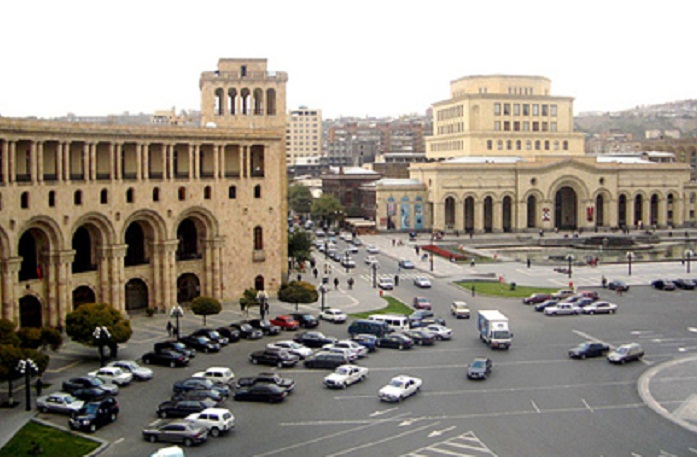The change, noted one analyst, is that this cabinet’s alleged “millionaire ministers” – Prime Minister Karen Karapetian, Health Minister Levon Altunian and Agriculture Minister Ignati Arakelian – come from outside the government and, therefore, are not seen as having recently used an official post to feather their nests.
“The difference is that at least some of the members of [the] new government, including the new prime minister, have not been part of the government institutions, so their assets are not seen as illegitimate by the public,” commented Mikayel Zolyan, a policy analyst with the Regional Studies Center, a Yerevan-based think-tank.
The provenance of a few of the new ministers’ wealth is linked to Russia. Most notably, 53-year-old Prime Minister Karapetian, a former deputy energy minister, held executive positions with Russia’s gas giant Gazprom structures: first, in Yerevan, and then in Moscow.
Not surprisingly, earlier this month he announced that Armenia’s ties with Russia would grow still stronger.
But you don`t have to be a gas company executive to become a millionaire in Moscow. Anyone living in that city becomes a millionaire after selling his apartment, said the new health minister, Levon Altunian. “I am just one of those people,” he demurred.
Until his appointment, Altunian served as the chief executive officer of the Russian-majority-owned IngoArmenia, a large-scale retail and commercial insurance company.
A former anesthesiologist, he now wants to end the ex-Soviet practice of giving presents to doctors to complement their official fees. Raising salaries in the healthcare sector and educating patients are the ways forward, he reasons.
He said Armenian patients only have themselves to blame for this custom, yet conceded that he’s taken part himself. “They’ve never given me flowers, but I did take [a bottle of] brandy,” he conceded.
Speaking of brandy, which happens to be Armenia’s best-known alcoholic beverage, Yerevan Brandy Company Chief Executive Officer Ignati Arakelian has been tasked with tuning up agriculture, a sector employing an estimated 45 percent of the country’s workforce and accounting for some 20 percent of its economy, according to official figures. The new agriculture minister said that his goal is to turn Armenian farmers into proper businessmen by bringing in better skills and larger investments.
New Culture Minister Armen Amirian, the former executive director of Armenia’s public radio, may not be as deep-pocketed as his colleagues in the agricultural and healthcare sectors, but, like Altunian, he also had a goofy confession to make upon his appointment.
Once his appointment was cinched, Amirian, 49, recounted, he bought a bouquet of roses, went up to his wife and said, “Honey, from now on I will have to devote much of my time to somebody else.” Allowing a moment of shock, he clarified that the “somebody else” was Armenian culture.
Amirian’s plan for his new significant other involves attracting international film production to Armenia through tax privileges and low production costs. He views Russia as the most promising partner in this endeavor given the numbers of Russia-based film professionals of Armenian descent.
Parliament late last week approved the new cabinet’s pledges for transparency, efficiency, and, in the prime minister’s words, a “free, fair and competitive environment for business,” but the opposition isn’t buying it.
Dismissing the plan as a facelift, opposition parties claimed that Sargsyan’s government is not capable of a true makeover as it still rests on an ossified network of corrupt interests. “We can’t support any government formed by the ruling party because [the experience of] past years gives us no reason to do that,” said Levon Zurabian of the Armenian National Congress.
Sargsyan’s critics have heard him announce a big change before, but claim that the president, ever a chess enthusiast, only moved around pieces on the board without changing the game rules.
They saw the current prime minister pop up as a face-saver for Sargsyan in 2010, when he was chosen to replace Yerevan Mayor Gagik Beglarian, whose bodyguards were then accused of violence. Hardly after a year in office, Karapetian moved to Moscow, while the controversial Beglarian later reappeared as the minister of economy and was only removed from service this year.
While the new cabinet is busy rolling up its sleeves, Zolyan, too, is skeptical about just how far they will go with reforms. “A systemic reform that would overhaul the whole government system is highly improbable as that would touch [on] too many vested interests, including those of the highest officials,” he commented to Tamada Tales. “So, I think what is going to happen will be an attempt to improve the efficiency of the existing system, rather than reforming it completely; limiting corruption, rather than getting rid of it completely.”
/Eurasianet/
More about:
















































